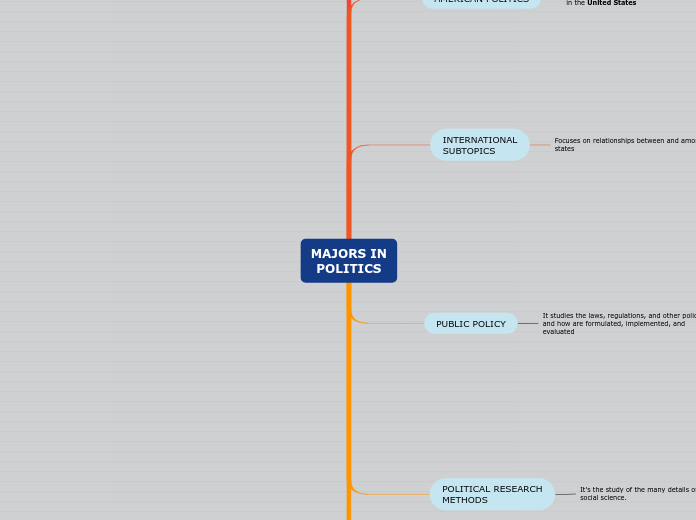MAJORS IN
POLITICS
COMPARATIVE POLITICS
Focuses on examining how different political systems
operate
It can include comparisons of systems at a macro or micro level, comparing general political structures or focusing on individual elements of
political systems
Example:
How democratic and authoritarian political structures differ
How specific rules governing campaign contributions differ from one country to the next
AMERICAN POLITICS
Consisting of an analysis of government and politics in the United States
It encompases:
Studies of federal politics
State politics
Local politics
Government
INTERNATIONAL
SUBTOPICS
Focuses on relationships between and among
states
Unlike comparative
politics
International relations studies what
transpires between state
It studies:
War
Regional relations
International organizations
Regional integration
International organizations
Military alliances
Economic pacts
PUBLIC POLICY
It studies the laws, regulations, and other policies and how are formulated, implemented, and evaluated
This subfield answers questions, like:
What makes a new policy necessary
How can policies be designed to meet
specific needs effectively?
What contributes to a policy’s effectiveness?
Why are ineffective policies sometimes continued rather than discontinued?
What should
be the standards for evaluating policies?
POLITICAL RESEARCH
METHODS
It's the study of the many details of empirical
social science.
For example:
Data collection
Measurement
Analysis
Political methods study seeks to understand the empirical research process in all its complexity
POLITICAL THEORY
A subfield of political science that seeks to answer
Normative questions
Political theory includes the study of:
The history of political philosophy
Philosophies of
explanation or science
Philosophical inquiries into the ethical dimensions
of politics
